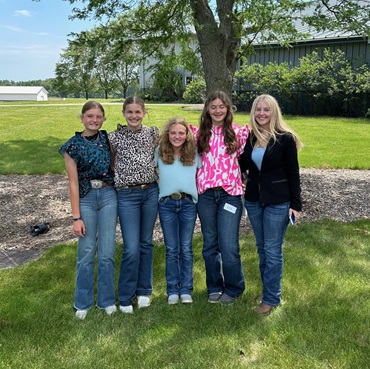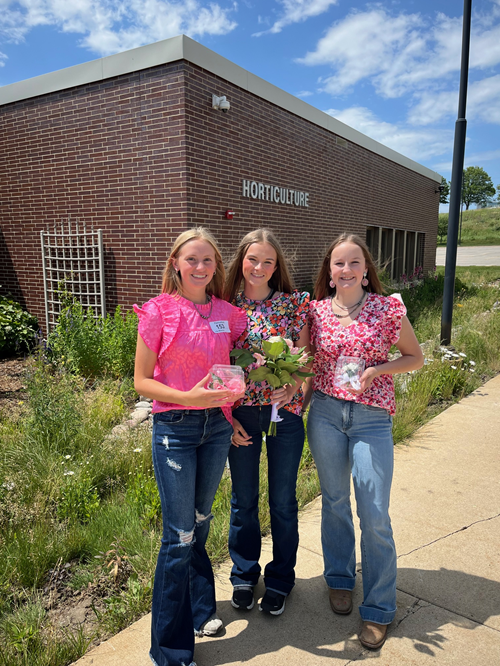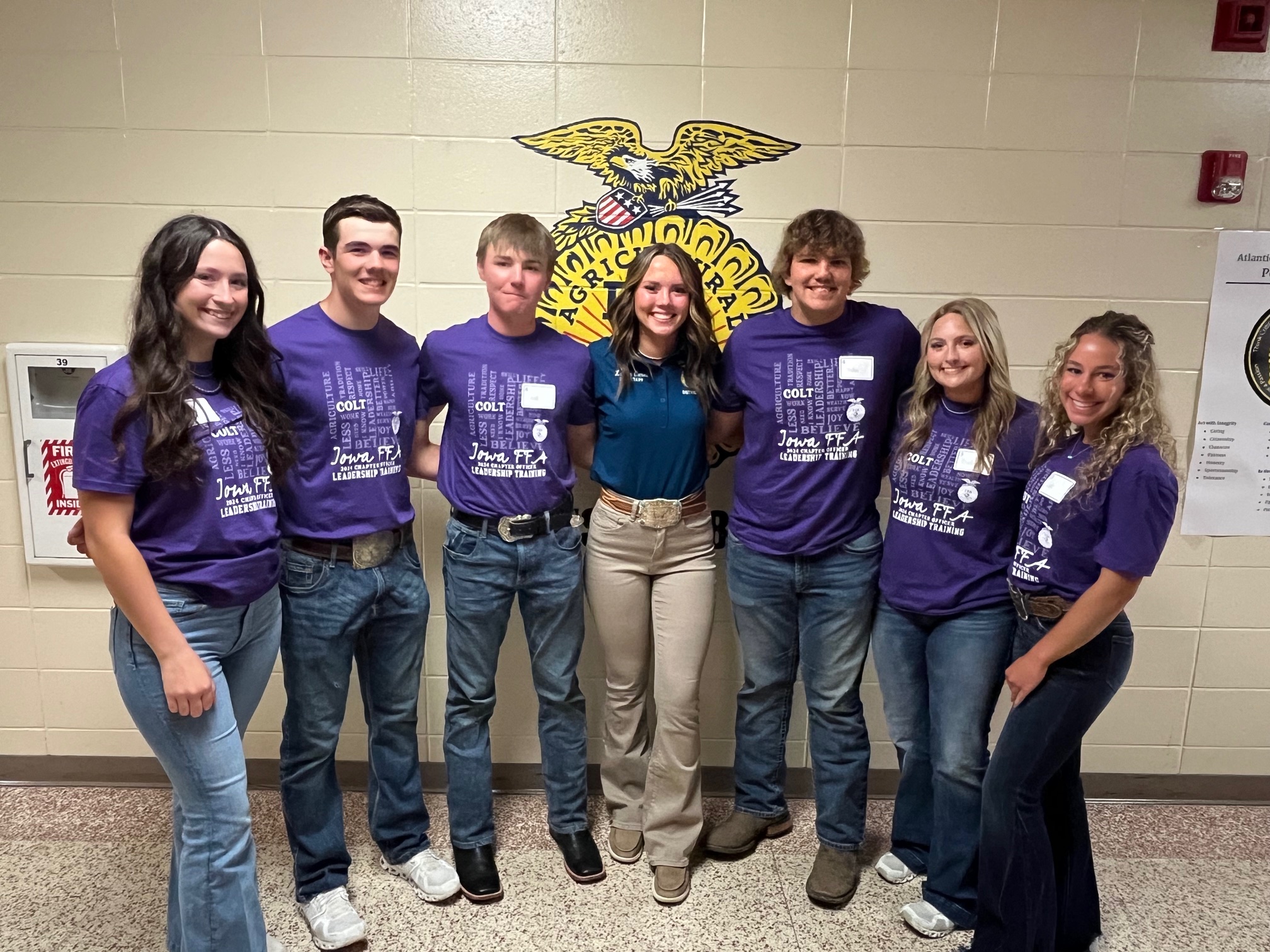CLICK HERE for the latest market quotes from the Iowa Agribusiness Network!
CLICK HERE for the latest market quotes from the Brownfield Ag News Network!
CLICK HERE for the latest market quotes from the Iowa Agribusiness Network!
CLICK HERE for the latest market quotes from the Brownfield Ag News Network!
(Iowa News Service) – Family farm advocates are calling for cuts in federal subsidies to large animal feeding operations known as CAFOs in the Farm Bill being debated in Congress. Iowa family farmers want more support for conservation programs that benefit smaller agriculture operations. Right now, CAFOs can qualify for as much as 100-million dollars every year to reduce some of the environmental damage they can cause. That’s taxpayer money that Barb Kalbach, a fourth-generation family farmer in Adair County, says could be put to much better use by small family farmers on their land.
CAFO operators contend they use the federal money to defend against environmental damage and that they’re always looking for cleaner, safer ways to raise high-quality meats while responding to increased consumer demand.
As a board member for the Campaign for Family Farms and the Environment, Kalbach is calling for more support of conservation programs that would help family farmers, but she is just as adamant that the long-standing rules governing CAFOs are changed.
The Farm Bill saw its first action in the House Agriculture Committee May 23rd. The House version of the measure also proposes 30-billion dollars in cuts to SNAP benefits over the next decade, including 170-million in Iowa.
Western Iowa is starting to see more widespread cases of trees becoming infested with the emerald ash borer. The first case was discovered in Woodbury County last year and that’s where Lindsay Meylor (MY-ler) works as a horticulture educator with the I-S-U Extension and Outreach. Meylor says her office is now fielding frequent calls from people, wondering what they can do to save their trees.
Meylor says insecticide is best applied before any signs of damage, and treatment — which can cost hundreds of dollars per application — will have to continue throughout the life of the tree. The insect can kill a tree within two years of infestation.
The D-N-R says when the invasive pest first appeared in eastern Iowa in 2010, there were an estimated 54-million woodland ash trees and another three-million planted in urban areas. It’s unclear how many survived. The emerald ash borer has been detected in all but one of Iowa’s 99 counties. Emmett in northwest Iowa is the only county without a confirmed case.
(Sheila Brummer, Iowa Public Radio)
(by Maddy Anderson, Atlantic FFA Reporter) – The Atlantic FFA Chapter competed in the annual Iowa FFA Horse Judging Career Development Event held at Kirkwood Community College on June 11, 2024.
Atlantic FFA had a team and individual that participated in this year’s Career Development Event. Team members Kayedance Sturm, Clara Kennedy, Rylan Martin and Paislee Klever earned a silver medal. Callie Rudy also competed in the middle school division.
The Horse Judging CDE is designed to provide the student an opportunity to display their agricultural knowledge and skills in the area of Equine Science. Each team member evaluated halter and performance classes. They also answered questions over the classes and gave oral reasons to explain their placings. A written examination was included along with a team problem solving competition. In the Performance division, Kayedance scored a nearly perfect score of 149 out of 150 possible points.
A unique part of the Horse Judging CDE is allowing 8th graders to participate. This year Atlantic FFA had 4, 8th grade members compete on the team. Team members Clara Kennedy, Pailsee Klever, Rylan Martin and Callie Rudy. When asked about their experiences Kennedy said, “I was impressed with our placing because ¾ of the team are 8th graders and this was our first FFA contest”. Rudy also said, “I thought it was a lot of fun. This event pushed us outside of our comfort zone and we all tried our hardest with the work paying off.”  Klever said, “For doing this for my first time and trying something new I thought it was a great experience. I was a little rusty on something’s but I thought we did good. Overall I thought it was a fun experience.” Martin finished by saying, “For this being my first time competing in a FFA contest and not really knowing what to do or what to expect I was impressed with how we did. Although some parts were a little rough, I was proud of myself and the team for trying our hardest and putting in as much effort as possible.”
Klever said, “For doing this for my first time and trying something new I thought it was a great experience. I was a little rusty on something’s but I thought we did good. Overall I thought it was a fun experience.” Martin finished by saying, “For this being my first time competing in a FFA contest and not really knowing what to do or what to expect I was impressed with how we did. Although some parts were a little rough, I was proud of myself and the team for trying our hardest and putting in as much effort as possible.”
The Iowa FFA Horse Career Development Event was made possible with support through the Iowa FFA Foundation Gold Standard Partners. The Horse Career Development Event was coordinated and held at the Iowa Equestrian Center in Cedar Rapids. Kirkwood Community College also provided lunch to all participants. The official judge was Mary Pohlmann from Truro.
(By Atlantic FFA Reports Maddy Anderson) – The Atlantic FFA Chapter competed in the annual Iowa FFA Floriculture Career Development Event held at Kirkwood Community College on June 11, 2024, placing 34th earning a Silver rating.
Addalyn Sonntag, Lily Wilrich and Maggie Cohrs participated in this year’s Career Development Event designed to provide students an opportunity to display their agricultural knowledge and skills in the area of floriculture. The event consisted of a general knowledge exam, problem solving and decision making, plant identification, floral design, pesticide use and application, floral production, and a team activity.
This is the first year Atlantic FFA has competed in a contest like this. Atlantic FFA Advisor Eric Miller said, “I was impressed with how hard the team has worked. This year we focused on the hands-on, practical part of the event. Next year, we will have a better idea what to prepare for.” The Atlantic FFA team would like to thank Ann Johnk from Farmhouse Flowers in Atlantic for helping train the team.

Picture Left to Right
Lily Willrich, Addalyn Sonntag, Maggie Cohrs
The Iowa FFA Floriculture Career Development Event was coordinated and conducted by Bob Smith, Hannah Dunlap and the faculty and staff at Kirkwood Community College. Kirkwood Community College also provided lunch to all participants. Official judges of the floral design components of the event include Karen Garrett, Debbie McCallister and Stacie Hoag from Flowers on the Avenue as well as Jill Kinsinger, former graduate of the Floral Careers program at Kirkwood.
PALISADE, Colo., June 14, 2024 – Agriculture Secretary Tom Vilsack today (Friday) announced the U.S. Department of Agriculture (USDA) is awarding $50 million to 141 awardees in 40 states and Puerto Rico, through the Farm Labor Stabilization and Protection Pilot Program (FLSP Program), reaching 177 unique agricultural operations and over 11,000 workers. The awards will help improve the resiliency of the U.S. food supply chain by addressing agriculture labor challenges and instability, strengthen protections for farmworkers, and expand legal pathways for labor migration. Vilsack says the program delivers on a commitment made as part of the Los Angeles Declaration on Migration and Protection and furthers the Administration’s commitment to a regional approach to migration in the hemisphere.
In northwest Iowa’s Woodbury County, Greg Smith Farms, LLC, in Lawton, was awarded $200,000 from the FLSP Program, to “lift up employees, and ensure cattle and crops are cared for in the best way possible: Implementing new bonus and loyalty bonuses, creating a paid sick leave policy and establishing an employee working group to ensure ideas are heard from throughout the operation. Additionally, FLSP will help bolster their recruitment strategy to employ an additional 10 farm workers.”
Ag Secretary Vilsack says “These awards will largely support small and mid-sized farms to ensure they can hire and retain the workers they need to be competitive in the market, while also lifting up rural communities across the country.” Vilsack said “Farmworkers make an incredibly important contribution to food and agriculture and ensure we have food on our tables every day. Improving working conditions and quality of life for farmworkers, both U.S. based workers and those that come to our country to work, is one key step in building a stronger, more resilient food supply chain. The Farm Labor Stabilization and Protection Pilot Program demonstrates the Biden-Harris Administration’s commitment to supporting employers and farmworkers alike.”
USDA announced the FLSP Program in September 2023, in coordination with other federal agencies, to help address workforce needs in agriculture; promote a safe and healthy work environment, as well as ethical recruitment for farmworkers; and support lawful migration pathways for workers, including expansion of labor pathways for workers from Northern Central America, through the H-2A visa program. FLSP was designed with significant input from immigration, labor, and agricultural stakeholders – informed by the experiences of farmworkers and farmers themselves.
The FLSP Program grants will support a range of required and elective supplemental commitments to expand benefits and protections for all employees.
(Radio Iowa)- The weed commissioner in a northern Iowa county is sounding the alarm after discovering a toxic plant at two sites that could pose a threat to livestock. Hancock County Weed Commissioner Jason Lackore (luh-COR) found poison hemlock at the yard waste dump in Garner last week.) “It’s really dangerous,” Lackore says. “…It can kill you.”
Last year, Lackore found the poisonous plant at Eagle Lake Nature Area near Britt after some work was done on a drainage ditch. “I’m guessing that contractor came from a county where hemlock is present and brought it here,” Lackore says. Both sites where the plant has been found are in public areas, which Lackore says is a big concern. “If it was any other plant, I wouldn’t be making such a fuss, but this plant — all parts are extremely poisonous to humans, domestic animals,” Lackore says. “And you hear a lot about livestock, cattle, ingesting small amounts. It’s fatal.”

Poisonous Hemlock (Iowa State University Extension Service photo)
According to the U-S-D-A, cattle can die after eating very small amounts of green or dried poison hemlock. Lackore says the site near Britt where he found poison hemlock is upstream from a major wetland complex where cattle are grazing. “At the other site, the plant is also upstream from a major river and drainage ditches and there are several cattle producers in that area just downstream where their cattle graze, pasture in these streams, in this major river where this plant is going to be traveling to,” Lackore says, “and that’s not going to be good.”
Poison hemlock, which starts growing in the early spring, has clusters of white flowers that develop into a green, ridged fruit that contains seeds. It’s most dangerous to livestock and pets. However, humans can be poisoned if they accidentally ingest poison hemlock. Symptoms include vomiting, seizures and respiratory failure. Poison hemlock was brought to the United States in the 1800s as a flowering plant for gardens. According to the U-S-D-A, it has spread to every state BUT Hawaii.
(Iowa Capital Dispatch) – State regulators are seeking to severely restrict the hunting of female deer in several southwest Iowa counties in an effort to increase the animal’s population in that area. Hunters in six counties would be barred from shooting white-tailed does during the first shotgun season, and none of the counties will have additional doe licenses available for other seasons.

Those counties include Fremont, Harrison, Mills, Monona, Pottawattamie and Shelby. The new restrictions already exist in 17 counties of northwest Iowa, where some have been in place for a decade. The Iowa Department of Natural Resources has been gradually reducing the number of licenses for antlerless deer in the southwest counties in recent years.
“This is in response to what we’ve noticed is a sustained population decline,” said Jace Elliott, the DNR’s deer biologist. “The hunters in that area, what I’m hearing from them is, it’s about time. I’m always surprised when we propose relatively large changes, and I don’t get a single person reaching out from that part of the state that’s even confused about why we’re going in that direction.”
Also, no doe licenses would be issued for Cass and Page counties, and the number of available licenses will be reduced for Adams and Montgomery counties. The department might finalize the new restrictions next month as it hosts a series of meetings that are part of its Western Iowa Deer Initiative, which is meant to solicit input from hunters and landowners.
The new restrictions represent a significant reversal of the state’s policies two decades ago, when there was a robust deer population in southwest Iowa. The DNR had made thousands of antlerless licenses available and also allowed hunters to use powerful rifles during special January seasons to encourage more participation. Tim Powers, an Iowa field director for Whitetails Unlimited, a group that promotes hunting and habitat conservation, said he trusts that the DNR’s decision to impose new restrictions is necessary to increase deer numbers.
The restrictions have worked in north-central Iowa, where they have been lifted or loosened in some counties in recent years as populations recovered, Elliott said. It will likely take at least five years to notice an appreciable improvement in southwest counties. Those with the quickest gains are typically adjacent to counties with larger populations and have more available habitat.
The following DNR public meetings are scheduled to go from 6:30 to 8 p.m.:
— July 8: Atlantic, at The Venue, 307 Walnut St.
— July 9: Denison, at the Lookout Shelter at Yellow Smoke Park, 2237 Yellow Smoke Road
— July 10: Council Bluffs, at Bass Pro Shops, 2901 Bass Pro Drive
— July 11: Shenandoah, at the Shenandoah Public Library, 201 S. Elm St.
— July 15: Onawa, at the Onawa Public Library, 707 Iowa Ave.
— July 16: Sioux Center, at the Sandy Hollow Clubhouse, 3395 400th St.
— July 17: Sioux City, at the Dorothy Pecaut Nature Center, 4500 Sioux River Road
— July 18: Cherokee, at the Cherokee Community Center, 530 W. Bluff St.
(Atlantic, Iowa, via Atlantic FFA Reporter Maddy Anderson) – Each year the Southwest district and Iowa FFA officers plan and facilitate Chapter Officer Leadership Training (COLT) Conferences for FFA members in the Southwest district. Atlantic High School welcomed almost 200 FFA members and advisors from 28 FFA chapters from all over the Southwest district on Tuesday June 4th, 2024.
While at Atlantic, on Tuesday, district and state officers lead four interactive workshops for FFA Chapter leaders, many of which are officers, for the annual COLT Conference. The workshops facilitated were local FFA Chapter programs focused in the areas of advocating for the agriculture industry, connecting with stakeholders, recruiting for the local chapter, and working as a cohesive team. FFA leaders also received training relative to their specific officer duties within the local chapter.
Atlantic FFA President Lola Comes said, “The chapter officer leadership training camp was a great opportunity that gave me new perspectives from other officers all around Southwest Iowa. This experience taught me several critical career skills, including professionalism, teamwork, and provided me with additional insight on the agriculture industry. My team and I plan to use these new skills to strengthen our chapter and increase community service time.” Atlantic FFA Officer team will spend some time together working on providing opportunities for the members, recruiting new members into the chapter and coming up with new activities for the chapter.

Left to right
Lilian Johnson, Joaquin Walies, Frank Freund, Lauren Comes, Hayden Kleen, Maddy Anderson, Lola Comes
Southwest District Secretary and Atlantic FFA member Lauren Comes said, “I had a lot of fun facilitating Colt and meeting new members all across the Southwest District. I loved seeing all the different personalities in one room and learning new things about the members I will be serving this year!”
Iowa FFA President, Colin Bauer, stated, “COLT conference provides a chance for FFA members to learn more about their responsibility as a local leader and is a conference for members to meet and connect with state, district and other chapter officers.”
COLT conference programming is designed as a two-year rotation of local leaders training. The focus areas of next year’s program include agriculture literacy, time management, professionalism, and self-confidence. The goal is to engage FFA members in learning about the tools that would allow them to be successful in anything they are part of through high school and beyond.
COLT conference is made possible with support from Farmers Mutual Hail Insurance of Iowa through the Iowa FFA Foundation.
(Radio Iowa) – Bird flu is confirmed at a third dairy in northwest Iowa as state and federal officials are trying to find out how the virus spreads between farms and livestock. On Wednesday, Iowa’s ag department confirmed avian influenza at a dairy farm with 17-hundred cows in Sioux County. State veterinarian Jeff Kaisand says most cows recover within a few weeks, unlike infected poultry, which are euthanized.
“We do have a USDA epi strike team that’s on the ground in Iowa right now that we requested,” Kaisand says. “They’re trying to help us understand some of those connections between farms to try and reveal some of those connections as best we can.” It’s the second case in Sioux County and the third in the state after the virus was first found in an Iowa dairy in O’Brien County last week. Kaisand says one priority is trying to figure out how avian influenza spreads between farms and livestock.
“We don’t know how it moves through the whole herd,” he says. “Does it go through all at once, or are there pockets that it doesn’t go through? And also trying to understand how it goes through a dairy herd or a poultry herd or vice versa.”
The Department of Agriculture and Land Stewardship recently started testing dairies within a 12-mile radius of infected poultry farms.
(Radio Iowa) – Blaming partisan politics and a packed legislative calendar, Iowa Senator Chuck Grassley says he’s no longer optimistic a Farm Bill will pass Congress this session. “I may often be the first to say that we probably won’t be getting a Farm Bill this year, but I’m also the first to say that farmers need the Farm Bill this year,” Grassley says, “because they need the certainty that comes with a five-year Farm Bill instead of a one-year extension.” The legislation is typically reviewed and renewed every five years, but it had to be extended last year into this fall, and Grassley fears another repeat is looming.
“Farmers today are operating off of the 2018 Farm Bill,” Grassley says, “a five-year Farm Bill which is now a six-year Farm Bill and I think soon-to-become a seven-year Farm Bill.” Grassley, a Republican, suggests the Farm Bill won’t pass this year because of Senate Majority Leader Chuck Schumer, the Democrat who’s created the framework for this session. “That’s my feeling. It’s not on the list of 17 bills that Schumer wanted to get done this year,” Grassley says, “and also, there’s just such few legislating days left before the 2018 Farm Bill sunsets, September 30th.” Grassley says there needs to be “more farm in the Farm Bill,” noting that 85-percent of the U-S-D-A’s spending outline is for food stamps. He says farmers in Iowa and nationwide will have a difficult 2025 if Congress -again- fails to update the important legislation.
“It’s not adequate from the standpoint that a one-year extension will still use 2018 prices,” Grassley says, “So it doesn’t reflect the inflation we’ve had in diesel, seed, fertilizer, chemicals and interest, and those are all things that should be added to the safety net for farmers.” He says the Farm Bill being drafted by Senate Republicans includes a 15-percent increase in commodities supports, stronger crop insurance, a doubling of funds for foreign market assistance — or exports, along with a healthy boost in spending on ag research.